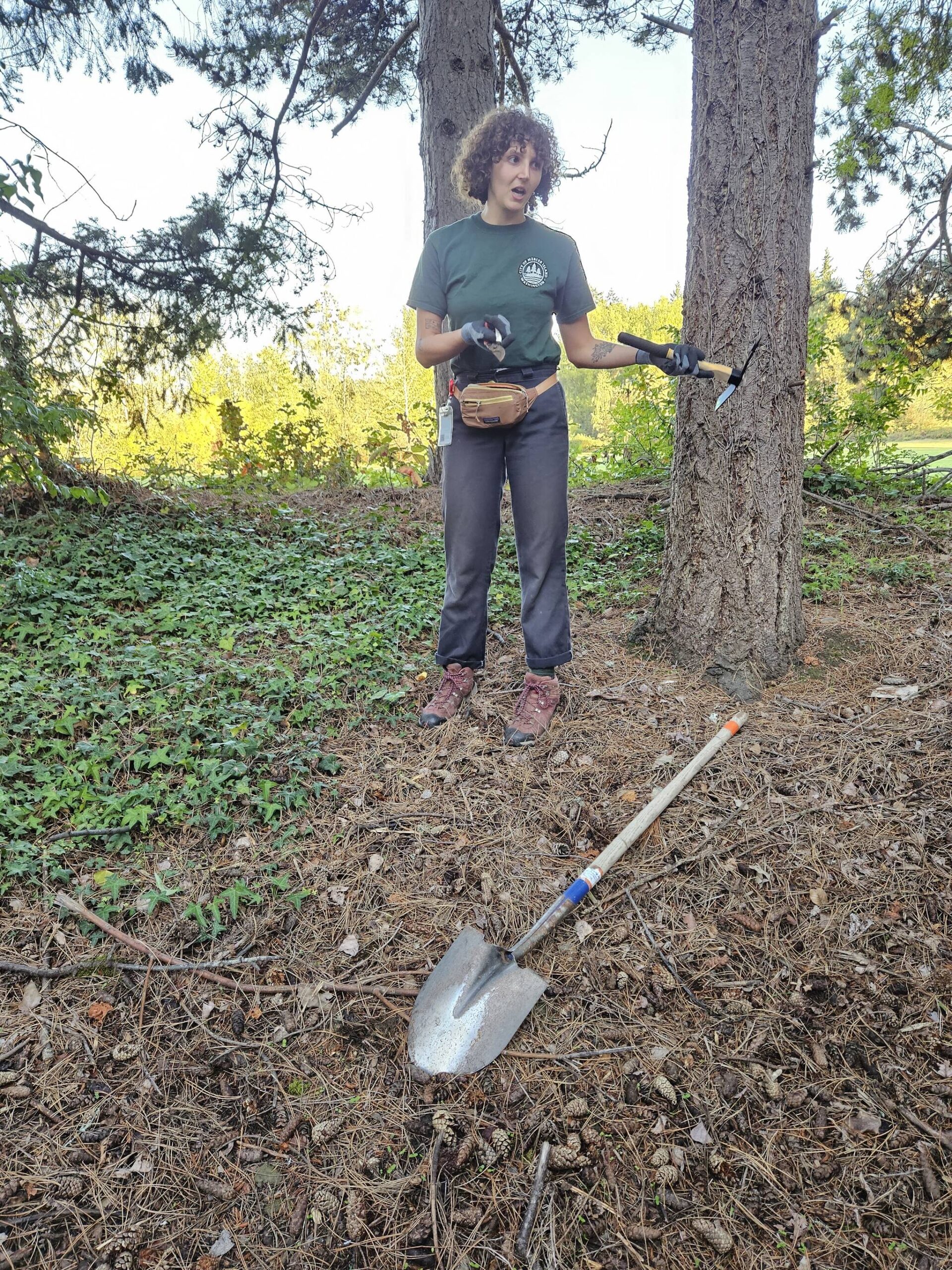“In Wildness is the preservation of the World. Every tree sends its fibers forth in search of the Wild.” — Henry David Thoreau
Do you love trees? Cherish forests? Like walking in the woods? Seeing wildlife? Or just enjoying nature?
Here on Mercer Island, we are blessed to have many acres of parks and open space, much of it forested.
But our forests today are threatened, according to the city’s Parks and Recreation Department. They need help, and you can provide it. Here’s how.
Become a volunteer “Forest Steward” through the city’s innovative program to engage local citizens in oversight, maintenance and restoration of parks and playgrounds.
You can sign up for an orientation and training program run by the department’s Jordan Fischer and other city staff. It’s a two-hour session open to anyone.
I took the class recently. A half-dozen of us gathered at the MI Community and Events Center. We’ll now join about 35 others already trained.
Here’s the job description: “Forest stewards are community members who want to get more involved in park restoration and clean-up. Stewards are often assigned a particular park that they work in, alone, with family/friends, or lead events with neighbors and the wider public. Stewards can work in multiple parks leading various volunteer events.”
The orientation was extremely well-organized and informative. Fischer has been coordinating volunteer activities in the parks for several years, and they are good at it. They have a genuine passion for the work.
At the orientation session, Fischer and colleague Lizzy Stone handed out detailed packets describing the duties of Forest Stewards, including:
• Ecological restoration – removing non-native plants such as ivy and blackberries.
• Weeding – cleaning up planting beds, pulling weeds and spreading mulch.
• Planting – putting new trees and shrubs in designated areas.
• Working with school and community groups on educational opportunities like plant-identification walks and outdoor-classroom activities.
• Partnering with organizations like the Washington Native Plant Society, Puget Sound Mycological Society, and Friends of Luther Burbank.
• Helping staff tables at public events such as the Farmers Market, Mostly Music in the Park, or Leap for Green.
Stewards are expected to participate in at least one event per quarter or spend at least 9 hours per quarter at a work site of our choice. We also get a really cool reflective vest that says “City of Mercer Island Volunteer” on the back.
“Anyone of any age can get involved,” Fischer said. “We work with people to figure out the best tasks. People want to feel they are connected to a group.”
After an hour inside, Fischer led our group down the steps to Luther Burbank Park, where they demonstrated the best way of removing ivy and piling the clippings onto a “raft” made of fallen branches where they are left to compost. Along the way, they also identified several native and non-native plant species.
The information packet includes a helpful list of 26 common native trees (such as Big Leaf Maple, Red Alder, Sitka Spruce, Douglas Fir, Western Red Cedar, Vine Maple, Red Osier Dogwood) and smaller plants (Salal, Oregon Grape, Salmonberry, Elderberry, Huckleberry, Lady Fern, Deer Fern, Sword Fern, Kinnikinnik).
It also includes a list of 7 non-native plants: Holly, Cherry Laurel, Knotweed, Himalayan Blackberry, Herb Robert, English Ivy, and Creeping Buttercup. Fischer noted that the widely used term “invasive” species is preferably avoided in favor of “opportunistic.” The handout stated: “The word ‘invasive’ carries with it a historical connection to xenophobia and overall negative connotation.”
They said that some non-native plants aren’t all bad. “It’s not the ivy’s fault. The ivy is actually living its best life here” — although it is also killing native trees and shrubs.
As for blackberries, they noted that the berries were brought into the U.S. by Luther Burbank himself for use in his botanical fruit experiments. He wanted to create fruit that had a longer shelf life and the Himalayan blackberry is larger and more sturdy than our native trailing blackberry.
Unfortunately, removing ivy and blackberries is among the more challenging tasks for volunteer workers. Ivy roots run deep and must be pulled and cut, while blackberry vines are prickly and tenacious. Still, citizen volunteers can help a lot.
If you want to learn more about park cleanup sessions, visit www.mercerisland.gov/calendar. Examples include a Halloween work party in Pioneer Park on Oct 26. Tools, gloves, water and snacks will be provided.
You could also join my Mercer Island Rotary Club on Saturday, Oct. 28, from 9 to 11 a.m. at Rotary Park, just north of the MI Library. Our group rakes leaves, pulls weeds, spreads mulch, removes ivy and blackberries, builds compost “rafts,” sweeps sidewalks, and does other needed tasks. Our club’s Parks Committee has made renovating parks and playgrounds one of our highest priorities.
The island’s trees and other plants will thank you for your service — and so will your fellow citizens.
–
Mercer Island resident John Hamer is a retired editorial writer and columnist for The Seattle Times. He grew up in Oregon, where his father was a wildlife biologist and professor of forestry who started the first outdoor classroom in that state to teach kids about the environment. Email jhamer46@gmail.com.


